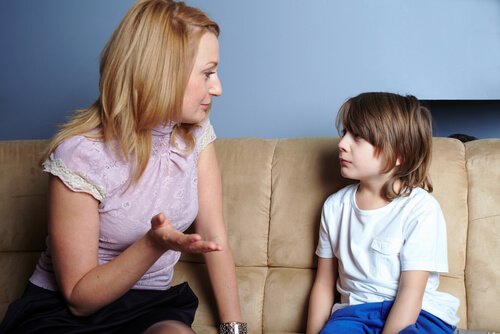Starting School: What You Need to Know

The day has arrived: your little one is starting school. This can be an anxious time for parents, with a multitude of hopes, fears and joys all bundled together. This can be even more pronounced with children who have spent the first three years of their lives always surrounded by family.
In this article, we’ll look at some tips that will make starting school easier for kids and families alike. Keep them in mind to ensure that your little one adapts as smoothly as possible.
Starting school: the adaptation period
When school begins at age three, it means your child will need to adapt to new people, new activities and a new environment. It also opens the doors to a world with a set structure of rules and limits that may differ from the ones at home.
To protect children’s emotional integrity, the school may feature an adaptation period that varies from institution to institution, or even region to region. If the idea of your child starting school makes you nervous, please remember that you’re not alone. To address this, the adaptation period includes families in the process.
The school may plan an initial activity that parents can attend with their children, allowing mothers and fathers to get to know the teachers, the physical space and the child’s classmates. It’s a good opportunity to make the little ones feel more confident about the experience ahead.

Ideas to help your child adapt
Young children’s adaptation to school is a gradual process. One common tradition is having them attend for 15 minutes the first day, then adding a few more minutes each day. Some schools’ adaptation periods can last a month or more.
It’s important to ask questions about the school’s approach to acclimating the children. Some schools may not offer much in the way of explanations, but families definitely have the right to ask.
Some children will be comfortable right away, while others will need more time. In any case, when the family projects calm and confidence when facing this new chapter, it will be easier for the children to deal with.
School should eventually become as natural as visiting friends or relatives. Talking about school at home with your kids helps them to approach the situation in the best possible way.
Of course, there are no magical answers and solutions. Each child is different and it’s important to trust them during this stage. Obviously, three-year-olds aren’t going to express themselves the way an adult would.
Patience is key before, during and after the adaptation period. Knowing that your child is starting school and learning new habits in an unfamiliar context, you need to remember that some acting out at home may be in the cards.
“When the family projects calm and confidence when facing this new chapter, it will be easier for the children to deal with.”
Tips for better adaptation
The following tips may be useful during the adaptation process:
- The ability to have a dialogue as a family allows children to express their concerns and fears. Communication is an essential part of home education.
- Mothers and fathers will want to ask about the teachers, the classmates, and the activities. This will help the children feel understood in their school experience.

- When children are very young, it may be tempting to let them sleep in for a few days instead of attending class. However, daily attendance is crucial to the adaptation period. Using respect, listening skills, and an open dialogue, you need to urge your child to attend regularly.
- Children may want to speak about an event from school that may not seem particularly significant. Nevertheless, it’s important to listen to everything they have to say, all their impressions and concerns.
In short, young children need a loving and attentive support system when starting school for the first time. The priority should be giving them the space they need to express themselves.
We need to trust that our children will learn to feel comfortable at school, that they’ll find their own way of learning, interacting, and being. This will help them build happy bonds with their peers and teachers alike.
The day has arrived: your little one is starting school. This can be an anxious time for parents, with a multitude of hopes, fears and joys all bundled together. This can be even more pronounced with children who have spent the first three years of their lives always surrounded by family.
In this article, we’ll look at some tips that will make starting school easier for kids and families alike. Keep them in mind to ensure that your little one adapts as smoothly as possible.
Starting school: the adaptation period
When school begins at age three, it means your child will need to adapt to new people, new activities and a new environment. It also opens the doors to a world with a set structure of rules and limits that may differ from the ones at home.
To protect children’s emotional integrity, the school may feature an adaptation period that varies from institution to institution, or even region to region. If the idea of your child starting school makes you nervous, please remember that you’re not alone. To address this, the adaptation period includes families in the process.
The school may plan an initial activity that parents can attend with their children, allowing mothers and fathers to get to know the teachers, the physical space and the child’s classmates. It’s a good opportunity to make the little ones feel more confident about the experience ahead.

Ideas to help your child adapt
Young children’s adaptation to school is a gradual process. One common tradition is having them attend for 15 minutes the first day, then adding a few more minutes each day. Some schools’ adaptation periods can last a month or more.
It’s important to ask questions about the school’s approach to acclimating the children. Some schools may not offer much in the way of explanations, but families definitely have the right to ask.
Some children will be comfortable right away, while others will need more time. In any case, when the family projects calm and confidence when facing this new chapter, it will be easier for the children to deal with.
School should eventually become as natural as visiting friends or relatives. Talking about school at home with your kids helps them to approach the situation in the best possible way.
Of course, there are no magical answers and solutions. Each child is different and it’s important to trust them during this stage. Obviously, three-year-olds aren’t going to express themselves the way an adult would.
Patience is key before, during and after the adaptation period. Knowing that your child is starting school and learning new habits in an unfamiliar context, you need to remember that some acting out at home may be in the cards.
“When the family projects calm and confidence when facing this new chapter, it will be easier for the children to deal with.”
Tips for better adaptation
The following tips may be useful during the adaptation process:
- The ability to have a dialogue as a family allows children to express their concerns and fears. Communication is an essential part of home education.
- Mothers and fathers will want to ask about the teachers, the classmates, and the activities. This will help the children feel understood in their school experience.

- When children are very young, it may be tempting to let them sleep in for a few days instead of attending class. However, daily attendance is crucial to the adaptation period. Using respect, listening skills, and an open dialogue, you need to urge your child to attend regularly.
- Children may want to speak about an event from school that may not seem particularly significant. Nevertheless, it’s important to listen to everything they have to say, all their impressions and concerns.
In short, young children need a loving and attentive support system when starting school for the first time. The priority should be giving them the space they need to express themselves.
We need to trust that our children will learn to feel comfortable at school, that they’ll find their own way of learning, interacting, and being. This will help them build happy bonds with their peers and teachers alike.
All cited sources were thoroughly reviewed by our team to ensure their quality, reliability, currency, and validity. The bibliography of this article was considered reliable and of academic or scientific accuracy.
- Peralvarez, M. M. (2014). El apego y el periodo de adaptación en la escuela infantil. Revisado el, 12. https://www.orientacionandujar.es/wp-content/uploads/2014/08/El-apego-y-el-periodo-de-adaptación-en-la-escuela-infantil.pdf
- García Parra, C. L., & Marín Buitrago, K. Y. (2017). El primer día de clase: desconocido por el entorno, reconocido por el niño(Doctoral dissertation, Corporación Universitaria Minuto de Dios). https://repository.uniminuto.edu/bitstream/handle/10656/5919/TPED_GarciaParraCindyLaura_2017.pdf?sequence=1&isAllowed=y
- González, M. C. P. (2010). Los primeros días de clase en educación infantil. Pedagogía Magna, (9), 89-94. https://dialnet.unirioja.es/descarga/articulo/3628215.pdf
This text is provided for informational purposes only and does not replace consultation with a professional. If in doubt, consult your specialist.








